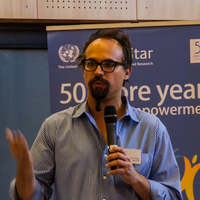
Jerry Kolo
Address: Sharjah, Sharjah, United Arab Emirates
less
Related Authors
C. Michael Hall
University of Canterbury/Te Whare Wānanga o Waitaha
Naim Kapucu
University of Central Florida
Oludamini Ogunnaike
University of Virginia
David Seamon
Kansas State University
Armando Marques-Guedes
UNL - New University of Lisbon
Noe Cornago
University of the Basque Country, Euskal Herriko Unibertsitatea
Scott Cohen
University of Algarve
Simon Springer
The University of Newcastle
Vibhuti Patel
SNDT Women's University
Kyle Whyte
University of Michigan
InterestsView All (14)










Uploads
Papers by Jerry Kolo
world, cities are rapidly morphing into regions, and these regions must collaborate and develop cost-effective infrastructure systems. A review of the collaborative regional approach to infrastructure development in the Emirates’ Abu Dhabi-Dubai-Sharjah (ADS) region offers practical lessons for other emerging regions.
world, cities are rapidly morphing into regions, and these regions must collaborate and develop cost-effective infrastructure systems. A review of the collaborative regional approach to infrastructure development in the Emirates’ Abu Dhabi-Dubai-Sharjah (ADS) region offers practical lessons for other emerging regions.
by infrastructure. Historically, infrastructure is a constant driver in the
development of societies. Yet, it remains the bane of development
worldwide today, especially in light of the world’s climatic, financial and
strategic challenges. The capacity and adequacy of infrastructure to meet
development needs cost-effectively depends on a range of intertwined
factors. In post-modern societies, infrastructure needs have increased
dramatically in quantity and quality, raising questions about the adequacy
of infrastructure to meet current and future needs. Today, discourse among
infrastructure experts, scholars and professionals alike, affirms the
‘unsatisfactory’ status of infrastructure worldwide, due to critical challenges
that are reviewed in this chapter. To address these challenges, experts agree
that, among other things, there is an urgent need for a new paradigm - next
generation (nextgen) – of infrastructure (NGI), one that is sustainable,
affordable, equitable, resilient and ‘smart’. From a public policy and
planning standpoint, the evidence-based research method was used to
address, in this chapter, unique characteristics of NGI and key implications
of NGI for sustainable urban development – SUD. The chapter developed
an analytical framework of five societal goal clusters in order to
disaggregate the implications of NGI. In conclusion, the chapter used the four main societal stakeholder sectors as a template to suggest policy and planning responses to the implications, along with recommendations of specific roles each sector should play in order to address the implications and provide the stock of NGI for SUD.
Keywords: Nextgen infrastructure; societal goal clusters; societal
stakeholder sectors; sustainable urban development.